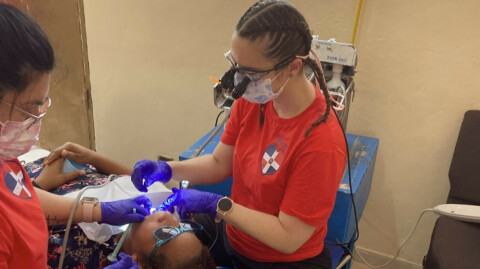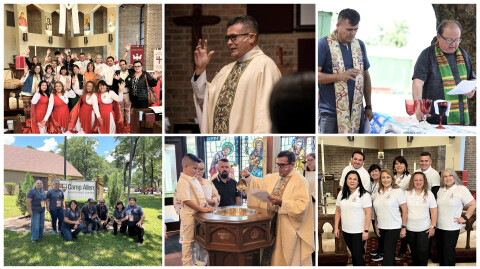In August of 2009, I wrote an article decrying the physical withdrawal from others that I noticed in many parishioners. In that article I was overly critical of social media and newfangled technologies like Skype and Twitter. It took 11 years and a Pandemic for me to eat my words. Now, I look forward to these technology outlets I criticized so fiercely 11 years ago because they allow us to remain connected with loved ones while in self-imposed quarantine. I am printing that article here to illustrate how much our lives have changed in 2020.
“The scene was surreal: There was a beeping sound on the office’s answering service; my telephone flashed with several unanswered messages; my mobile phone reminded me of calls I still needed to make; my e-mail in-box had dozens of messages and chain-letters; and my Facebook page informed me that I had seven friend requests, four suggestions, thirteen highlights, and over a dozen messages in my inbox. I held my breath for a few seconds and closed my eyes, after which I sat down at my desk and paid homage to the communication gods of our age. My vacation was over, and reality had set-in again.
My experience is not unique. All of us are confronted daily with a variety of voices that require our time. Ours is a globalized world where it is possible to Skype with relatives in Japan, chat with colleagues in Nigeria, Twitter with our pals in South Africa, and use our blog to update the entire world in real time about every aspect of our life. I can participate in an Evangelism webinar at Uganda Christian University, while watching the exact second the Pinata is broken at one of my relative’s birthday party in Medellin, Colombia. And we can do it all without ever leaving our desk. In this new world of communication, clothing is optional, proper hygiene is not required, speaking in complete sentences may actually slow us down, and we can manipulate sounds and images any way we like to make ourselves sound and look more attractive, more interesting, and less neurotic. This is a brave new world where fantasy and reality have joined in perfect matrimony, giving birth to a new pseudo-reality where superficiality and emotional disconnection are encouraged. In this new reality, immediacy, multi-sensory stimulation, and an obsession with the broadcasting of the self have become the narcotic through which we medicate our sense of isolation, our insecurity, and our desperate loneliness.
The irony, however, is that much of this communications craze has done little to deal with the hunger for companionship, meaning and relevance that all of us feel. We “psychotherapize” each other from the safety provided by the impersonal Word Wide Web, distilling brief advice comments and pearls of wisdom, while isolating further and further from each other. We retreat even as our list of friends increases in our social networking sites. How is it possible that we can have hundreds of communications with others on any given day and never have to utter a single spoken word, or leave our room for even five minutes? How can we text-message at 70 words per minute and still feel alone, disconnected, misunderstood, and fragmented? How can we hear the voice of the Living Christ, calling us into a deeper relationship with him and with each other, in an environment where all this noise competes for our attention?
Now, I am not calling for a boycott of the Internet, social networking sites, or cell phones. The truth is that all these communication instruments have made life easier for all of us, and have made global communications virtually free, easy, and convenient. As Christians we cannot bury our heads in the sand, wave our tight fists in the air, and rage against “these kids of today.” Perhaps what we are seeing today is the fulfillment of Isaiah’s prophesies, “With foreign lips and strange tongues God will speak to this people” (Isaiah 28:11). What I am saying, however, is that as Christians we must transcend this fantasy-steeped reality. We must celebrate full engagement with our world by visiting the sick and the lonely rather than just e-mailing them a cute cartoon from the Hallmark store. We must actively work on behalf of the poor in our communities rather than just joining Internet Causes that do nothing to alleviate the pain of the world, even if they do make us feel a little better about ourselves. We must enter physically into the world of those suffering from depression, loss, or addiction, rather than just sending them affirmations and happy thoughts. We must join our brothers and sisters around the communion table, where together we place at the foot of the cross our sins, our pain, and our afflictions. New cyber-church communities can be important individual prayer tools, but they can never replace the living body of Christ, gathered as an assembly of believers whose hope rests in Christ and Christ alone. (I wonder if cyber-priests and cyber-deacons have Cyber-Church Pension Funds?)”
I can almost hear the sarcasm dripping from my self-righteous mouth after this last sentence. Little did I know back then that COVID-19 would force me one day to become a cyber-priest, tele-evangelist, and rector of a church forced to meet online for over six months. Thankfully, Cyber-priests have real pension funds, without which our arrogant and grandiose selves would have to beg for food after we retire. I do agree with the article’s conclusion, that “we must create noise-free zones where we can sit in silence and talk to the God who speaks to us in silence, guiding us into all truth. We must turn off all the voices competing for attention, even if it is for a brief time every day. We must let God’s Holy Scripture feed and nurture us, so we may be able to rejoin the world filled with God’s Holy Spirit. We must be still and know that God is God and our future rests safely in his open hands.”
May God continue to bless you,
Fr. Roman+





